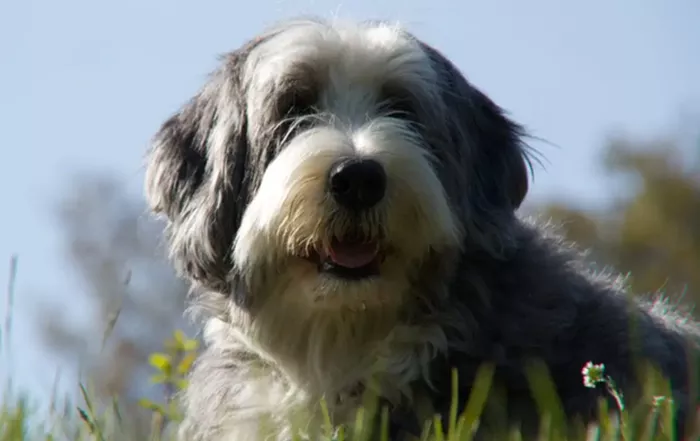Bearded Collies, often called “Beardies,” are a breed of herding dog known for their shaggy coats and lively personalities. Originating from Scotland, these dogs were traditionally used by shepherds to herd sheep and cattle. Their name comes from the distinctive beard-like hair around their muzzle. Bearded Collies are medium-sized dogs, standing about 20 to 22 inches tall at the shoulder and weighing between 45 to 55 pounds. They are known for their intelligence, agility, and friendly nature, making them popular as both working dogs and family pets.
The History of Bearded Collies
The history of Bearded Collies dates back several centuries. They are believed to have descended from European herding dogs that were brought to Scotland by traders. Over time, these dogs were bred with local Scottish dogs, resulting in the Bearded Collie we know today. The breed was primarily used by shepherds in the Scottish Highlands, where their thick coats protected them from the harsh weather conditions. Despite their long history, Bearded Collies were not officially recognized by major kennel clubs until the mid-20th century. The American Kennel Club (AKC) recognized the breed in 1977.
The Role of Bearded Collies in the Animal Industry
Bearded Collies have played a significant role in the animal industry, particularly in herding and farming. Their natural herding instincts and ability to work in difficult terrain made them invaluable to shepherds. In addition to herding, Bearded Collies have also been used in dog sports such as agility, obedience, and flyball. Their intelligence and eagerness to please make them excellent competitors in these events. Furthermore, their friendly and affectionate nature has made them popular as therapy dogs, providing comfort and companionship to people in hospitals, nursing homes, and schools.
The Current Status of Bearded Collies
As of now, Bearded Collies are not considered an endangered breed. According to the AKC, they are ranked 104th out of 197 breeds in terms of popularity. While they are not as common as some other breeds, such as Labrador Retrievers or German Shepherds, there is a stable population of Bearded Collies worldwide. Breeders and enthusiasts are dedicated to preserving the breed’s unique characteristics and ensuring its continued existence. However, like many purebred dogs, Bearded Collies are susceptible to certain genetic health issues, which can affect their overall population if not managed properly.
Factors Affecting the Population of Bearded Collies
Several factors can influence the population of Bearded Collies, both positively and negatively. One of the main concerns is the breed’s susceptibility to genetic health problems, such as hip dysplasia, autoimmune diseases, and eye conditions. Responsible breeding practices, including health screening and genetic testing, are essential to minimize these risks and maintain a healthy population. Another factor is the breed’s popularity. While Bearded Collies have a dedicated following, they are not as widely known as some other breeds, which can limit their numbers. Efforts to promote the breed through dog shows, social media, and breed clubs can help increase awareness and interest in Bearded Collies.
Conservation Efforts for Bearded Collies
Although Bearded Collies are not endangered, conservation efforts are still important to ensure the breed’s long-term survival. Breed clubs and organizations, such as the Bearded Collie Club of America (BCCA) and the Bearded Collie Club in the UK, play a crucial role in promoting responsible breeding practices and educating the public about the breed. These organizations often host events, such as dog shows and herding trials, to showcase the breed’s abilities and encourage responsible ownership. Additionally, genetic research and health screening programs are essential to identify and address potential health issues within the breed.
The Importance of Responsible Breeding
Responsible breeding is key to maintaining the health and population of Bearded Collies. This includes selecting breeding pairs based on health, temperament, and conformation to the breed standard. Breeders should also conduct health screenings and genetic tests to identify and avoid passing on hereditary conditions. By prioritizing the well-being of the dogs, responsible breeders can help ensure that future generations of Bearded Collies are healthy and genetically diverse. Potential owners should seek out reputable breeders who adhere to these practices and are committed to the breed’s preservation.
The Role of Potential Owners in Preserving the Breed
Potential owners also play a vital role in preserving the Bearded Collie breed. Before bringing a Bearded Collie into their home, individuals should research the breed thoroughly to ensure it is a good fit for their lifestyle. Bearded Collies are active, intelligent dogs that require regular exercise, mental stimulation, and grooming. Owners should be prepared to meet these needs and provide a loving, supportive environment. Additionally, adopting from reputable breeders or rescue organizations can help support the breed’s preservation and reduce the number of dogs in shelters.
The Future of Bearded Collies
The future of Bearded Collies looks promising, thanks to the efforts of breed enthusiasts, responsible breeders, and dedicated owners. While they may not be as popular as some other breeds, Bearded Collies have a loyal following and a strong presence in the dog world. Continued efforts to promote the breed, educate the public, and address health concerns will be essential to ensuring their long-term survival. With proper care and attention, Bearded Collies will continue to thrive as both working dogs and beloved family pets.
Conclusion
In conclusion, Bearded Collies are not currently endangered, but their population requires careful management to ensure their continued existence. The breed’s history, role in the animal industry, and unique characteristics make them a valuable part of the canine world. By promoting responsible breeding practices, educating potential owners, and supporting conservation efforts, we can help preserve the Bearded Collie breed for future generations. Whether as herding dogs, competitors in dog sports, or cherished companions, Bearded Collies have a special place in the hearts of those who know and love them.
Related topics:
Are Bearded Collies High Maintenance?
How Smart Are Bearded Collies?
Unveiling the Lifespan of Bearded Collies: A Comprehensive Guide


